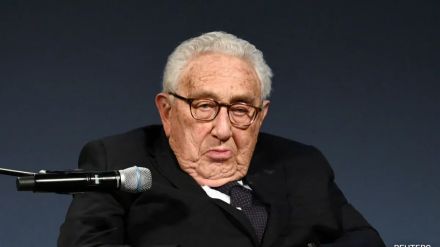By Dr Ajey Lele
Dr Henry A. Kissinger died on November 29, 2023 at the age of 100. His legacy is marked by both respect and reproach for his unapologetic quest of practical politics principles. In the history of the US governments, he is the only individual till date, to hold a dual responsibility of national security adviser and secretary of state at the same time. He was a statesman and diplomat, while in service and subsequently gained recognition as one of the most respected scholars in international relations. His stature was such that he could be viewed as a one-man university, which played a major role towards shaping the global politics and opinions and economic thinking.
He exercised absolute power over US foreign policy during the administrations of Presidents Richard Nixon (1969-1974) and Gerald Ford (1974-1977). All these years, for many, Kissinger’s political poker game has been a mystery and it was known that he will keep his cards close to the chest and take a call, which could surprise many. In July 1971, Henry Kissinger secretly visited Beijing during a trip to Pakistan, and laid the groundwork for Nixon’s visit to China. It was a Cold War Era period and the US was very keen to exploit the fault lines in the China-Soviet relationship and ensure that China does not become a part of the Soviet bloc. Nixon was interested in changing relations with China and it was Kissinger who played a major role towards Sino-US reconciliation.
The US had backed Pakistan during the 1971 War. The Nixon administration was worried about the possible spread of Soviet influence in the Indian subcontinent owing to India’s growing ties with the Soviets. Today, the US is leaning towards India due to their concerns about the rise of China. However, during the 1970s, the US was reaching out to China owing to the cosiness in the India and Soviet relationships. During the 1971 war, it was Kissinger who was keen to make the India-China border broiling. He had scant respect for Mrs Indira Gandhi and is known to have used abusive words against her in particular and all Indians, in general.
Subsequently, he is known to have expressed remorse about his views, but definitely such views speak volumes about how the US views India historically. Even today, the US friendship with India is out of political necessity and could be viewed as the continuation of the ‘Machiavellian’ Kissinger’s policies.
Today, in the ongoing Hamas-Israel conflict, the US is siding with Israel and the reasons for that are well-known. It is broadly acknowledged that the Jewish community has a major impact towards deciding on the defence and foreign policies of the US. Kissinger was a German refugee, a Jew by birth who had fled Nazi Germany with his family in 1938. He got educated in Harvard University, where he got his PhD. He attained great fame with his 1957 publication, a book titled “Nuclear Weapons and Foreign Policy.” In the US political circles, he was respected by both the Republicans and Democrats.
Many believe that Kissinger’s geopolitical worldview was all about the ‘balance of power’. Post 1977, various serving US Presidents are known to have sought his off-the-record guidance. Possibly, his ideas did not revolve around issues like spread of democracy and being moralistic in politics. One of his biographers mentions that, ‘he believed in power and influencing power, even if the people in power disagree with you.’
There is an irrefutable link between Kissinger’s immigrant past and his succeeding conservative political instinct. He was recruited in the army during World War II, and was sent back to Germany as a ‘private’ in 1944. He had worked with Army Intelligence and was instrumental in breaking up Nazi sleeper cells. He was awarded the Bronze Star and promoted to staff sergeant for his achievements. It could be said that his military exposure possibly could have helped him to become an astute foreign policy practitioner.
It is important to realise that only bright minds do not guarantee success in any endeavour. What is important is to have the right circumstances. Today, one of the major possible military flashpoints in the world is the Taiwan theatre. It is an important issue of anxiety amongst the Sino-US relationship. During the 1970s, Kissinger believed that the Taiwan problem could gradually fade away and was possibly trying to evolve a peaceful solution. But Nixon’s resignation in 1974 appears to have hampered his efforts. Kissinger was basically a ‘backroom boy’ and has not spoken much about his efforts then. Also, after Nixon, the next administration of Gerald Ford had political limitations. The republican right was averse to any proactive engagement of China.
All in all, a person who was awarded the Nobel Peace Prize for his negotiations to end the Vietnam War was known for his realpolitik approach. For him premeditated pragmatism was more important to have strategic gains and ethics, moral and human rights always took the back seat. He always kept national interests supreme.
The author is a consultant, MP-IDSA, New Delhi.
Disclaimer: Views expressed are personal and do not reflect the official position or policy of Financial Express Online. Reproducing this content without permission is prohibited.
